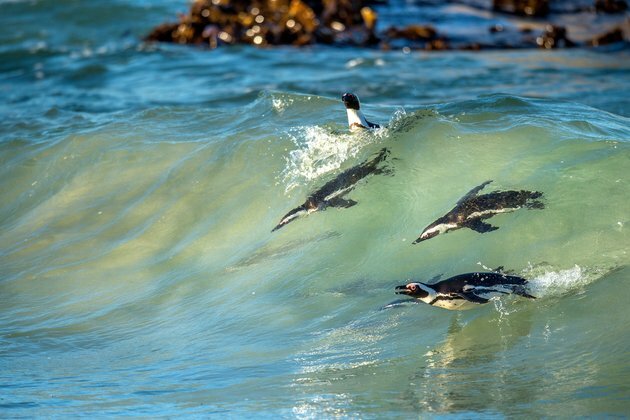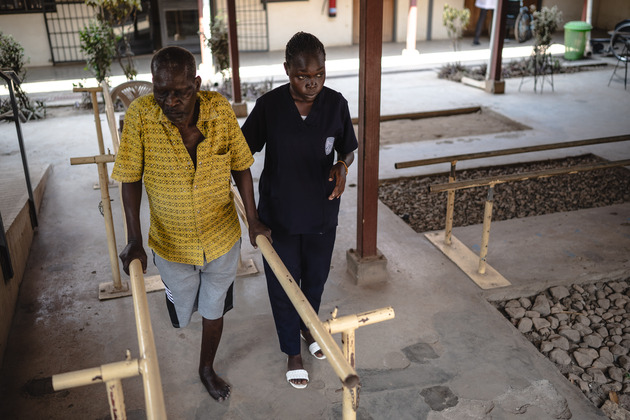Eavesdropping on nature: why Africa needs more bioacoustics research
The Conversation
27 Jan 2022, 00:10 GMT+10

Sound plays an important role in nature. It also helps researchers to study and interpret different landscapes and the species that live there. Most animals make sound; biologists often rely on chirps, squawks or whistles to describe and identify species or groups of species. They can also extract behavioural information from sound. For instance, researchers have found that the yellow-casqued hornbill in West Africa can distinguish predator-specific alarm calls made by Diana monkeys.
Vocalisations can also simply indicate a species' presence. A recording process called passive acoustic monitoring recently revealed the presence of the cusk-eel, an elusive fish species, in a marine protected area in the Adriatic Sea.
The study of biological sound produced, transmitted or perceived by animals, both on land and in water, is called bioacoustics. The discipline can be traced back to the 1920s; it was formalised with the establishment of the International Committee for Bioacoustics in 1956.
Read more: Experience the spectacular sounds of a Murrumbidgee wetland erupting with life as water returns
There are several advantages to sound as a study mechanism. Automated recording processes bolstered by technology allow scientists to record at remote sites or for extended periods of time. These processes also eliminate the effect that a human's presence might have on their surroundings. And as technology has improved, recording devices have become more affordable for researchers and citizen scientists alike.
My co-authors and I set out to assess the state of bioacoustics research on the African continent. Our aim was to create a roadmap to help guide future work within the discipline on the continent. We analysed 727 publications - relatively broad, given that nothing of this scale had previously been done - dating from 1953 to mid-2020.
We found that most of the research related to land rather than marine or freshwater animals. We also found that eastern and southern Africa dominated the output for this discipline - but that a majority of researchers came from outside the continent. African-affiliated researchers have started closing that gap in the past 20 years.
There is plenty of work to do to ensure that other species, geographical areas and ecosystems across Africa are better understood through bioacoustics.
Gaps highlight opportunities
We accessed three major online databases and searched for scientific literature with varying keyword combinations. Publications that met our criteria were extracted and scanned for a range of information. This related largely to authorship, study site and study subject. Chronologically, the first piece of research we identified dates back to 1953. In it, birdsong was used to describe spectacled weaver behaviour in South Africa.
Our record suggests that bioacoustics related research output has grown over time and especially since the turn of the millennium - in correlation with advances in technology and data storage. Nearly two-thirds of the studies we evaluated focused on mammals.
We detected biases within the mammalian class. Primate, and more specifically chimpanzee related research, has enjoyed a disproportionate amount of bioacoustics related attention. As a group, bats have also aroused considerable scientific curiosity; their echolocation behaviours are reliable species classifiers.
A penchant for mammal-based research among biologists and ecologists isn't news. But we are flagging it because it raises concerns that conservation efforts are heavily skewed towards some species. This leaves other species at risk.
Our findings also suggest that more bioacoustics attention needs to be directed towards non-terrestrial habitats. Land-based studies made up close to 90% of our entire record. This ought to be addressed, given what human activity has done to the world's oceans and freshwater systems.
A 2021 review published in the journal Science outlined the acoustic challenges our oceans face today. Along the South African coastline, for example, African penguins have been found to evade noises produced by the seismic exploration of gas and oil in the ocean. This has taken on even more relevance with oil giant Shell's recent attempts to conduct exploratory activities near the country's Wild Coast.
Read more: Are seismic surveys driving penguins from their feeding grounds?
But it's not just about assessing immediate threats. Acoustic monitoring can help supply high-quality data to regional or global biodiversity databases, which are designed to inform environmental management and policy.
We suggest that the comparatively slower uptake of underwater bioacoustics research on the African continent could be put down to the lack of affordable equipment and costs associated with deploying it. Equipment affordability issues are, at least, gradually being remedied through the development of more cost-effective technology.
Regional differences
On land, African bioacoustics research has been concentrated in certain regions. East and Southern Africa have, to now, hosted a disproportionately large amount of bioacoustics themed research compared to the rest of the continent. North Africa was strikingly underrepresented in our study.
On a more localised scale, protected areas and their relative ease of access for researchers have been key drivers of regional bioacoustic research efforts in Cote d'Ivoire's Taϊ National Park and Uganda's Budongo Central Forest Reserve, for instance. These territories are well known for their primate populations, especially chimpanzees.
Critically, we weighed up African versus non-African affiliated contributions to the field. Authors attached to non-African institutions heavily outnumbered their African counterparts. African-affiliated contributors have only started closing that gap over the last 20 years or so.
Building the field
This research is meant to do more than just highlight gaps in the continent's bioacoustics related output. Arguably more importantly, it was designed to aid, encourage and promote African capacity building and participation in an emerging field. This is in line with the work being undertaken by the African Bioacoustics Community. The forum was established in 2018 to connect people working on bioacoustics on the African continent and is preparing to host its third ever conference this year.
Acoustic monitoring has been touted as a "key monitoring solution" in the pursuit of answers to biodiversity questions. For Africa this spells boundless potential.
Fannie Shabangu, marine biologist, South African Department of Agriculture, Forestry and Fisheries; Tess Gridley, principal scientist, Sea Search Research and Conservation; Heiko Wittmer, associate professor, Victoria University of Wellington and Stephen Marsland, professor, Victoria University of Wellington co-authored the research on which this article is based.
Author: Frowin Becker - PhD Candidate, Te Herenga Waka УЂтЌт Victoria University of Wellington 
 Share
Share
 Tweet
Tweet
 Share
Share
 Flip
Flip
 Email
Email
Watch latest videos
Subscribe and Follow
Get a daily dose of Madagascar Sun news through our daily email, its complimentary and keeps you fully up to date with world and business news as well.
News RELEASES
Publish news of your business, community or sports group, personnel appointments, major event and more by submitting a news release to Madagascar Sun.
More InformationAfrica
SectionDale Steyn backs Afghanistan to win ICC tournament in next decade
New Delhi [India], March 1 (ANI): Afghanistan's steady rise in international cricket has caught the attention of cricketing greats,...
"No need to manufacture news, world wants to know India": PM Modi at NXT Conclave 2025
New Delhi [India], March 1 (ANI): Prime Minister Narendra Modi on Saturday highlighted India's capability to efficiently organize large-scale...
Xinhua Photo Daily | March 1, 2025
BEIJING, March 1 (Xinhua) -- A selection of the best press photos from Xinhua. A drone photo taken on Feb. 27, 2025 shows the construction...
SOUTH SUDAN-JUBA-PHYSICAL REHABILITATION CENTER
(250301) -- JUBA, March 1, 2025 (Xinhua) -- A nurse from the International Committee of the Red Cross (ICRC) South Sudan delegation...
Indian Coast Guard Ship 'Sachet' departs for Sudan with over 2 tons of life-saving medicines
New Delhi [India], March 1 (ANI): The Indian Coast Guard Ship Sachet departed for Sudan on Friday, carrying over two tons of life-saving...
US tariff hike on vehicle imports could impact Nigeria's auto market
ABUJA, NIGERIA — For longtime automotive importer David Tope, Nigeria's auto market has become increasingly difficult. He used to...
International
SectionThree US female tourists found dead at Belize beach resort
MEXICO CITY, Mexico: Three American women were found dead over the weekend at a beach resort in Belize, police said. Officials are...
China launches live-fire drills after Vietnam's territorial claim
BANGKOK, Thailand: Chinese authorities said they started live-fire military exercises in the Gulf of Tonkin this week, just days after...
French warships join Philippines for South China Sea Drills
ABOARD THE CHARLES DE GAULLE, Philippines: France's nuclear-powered aircraft carrier and its warships arrived in the Philippines over...
Fresno State suspends two players, removes one amid gambling probe
FRESNO, California: Fresno State suspended two of its top men's basketball players last weekend and removed a third player from the...
Poland to continue covering Ukraine’s Starlink costs, says deputy PM
WARSAW, Poland: Deputy Prime Minister Krzysztof Gawkowski confirmed over the weekend that Poland has been covering the cost of Ukraine's...
Opinion - Israel's government exploited hostages
Israel sustained the West's support for its slaughter in Gaza for 15 months only through an intensive campaign of lies. It invented...













